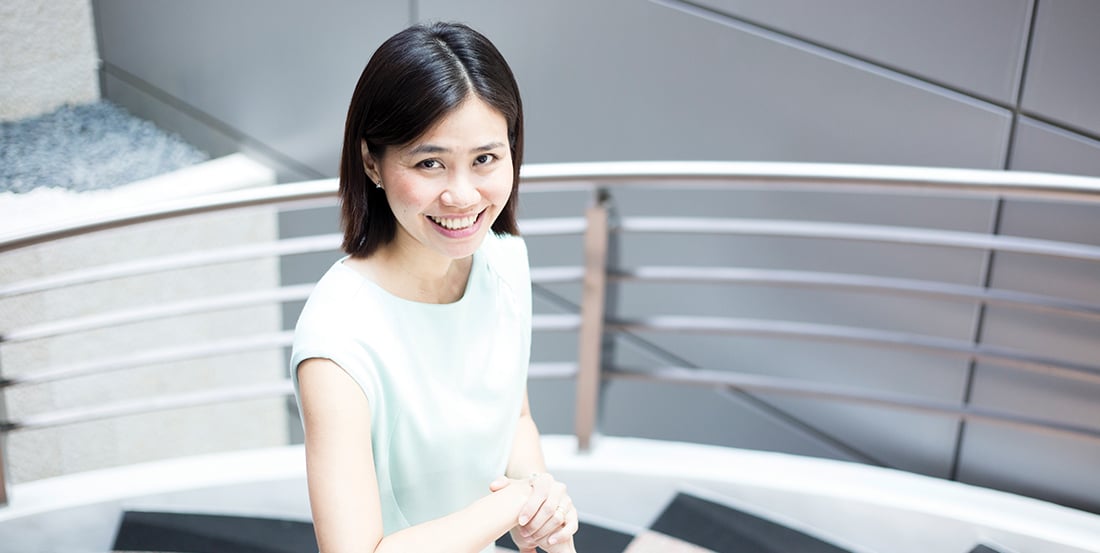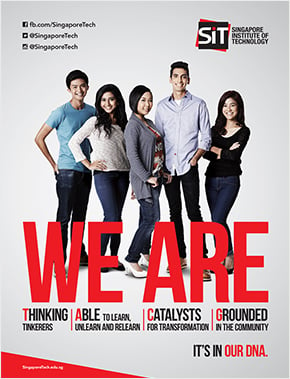Singapore Institute
of Technology (SIT)
believes in integrating
theory with handson
application, and
its new four-year
Occupational Therapy
programme (to be
launched in 2016)
will do just that in
grooming SIT students
to become future
‘Masters of Daily
Living’.
To an Occupational Therapist (OT), the
word 'occupation' refers to important,
meaningful activities which people
perform on a daily basis – eating, getting
dressed, playing and other daily routines which
are significant in our lives. For people with
mental, physical or cognitive disabilities, these
daily occupations may be adversely affected.
OTs play an important role in helping to restore
the dignity and productivity of patients in their
day-to-day living.
In light of the noble duty that OTs perform,
they have been fondly nicknamed the 'Masters
of Daily Living'. This epithet is a key motivator
for Dr May Lim, Assistant Professor, SIT, whose
work involves the setting up of an academic
framework to educate the next generation of
OTs.
Dr Lim, who is also Deputy Director of Centre
for Learning Environment and Assessment
Development (Co-LEAD), SIT, is not only
involved in designing 'authentic assessments'
and interactive class sessions for the degree
programme, she also coordinates faculty
development programmes in learning and
teaching. She also engages regularly with
hospitals and Voluntary Welfare Organisations
(VWOs) to get their input on Occupational
Therapy requirements.
Dr Lim adds with a smile, “I strongly believe in
keeping in touch with clinical practice – outside
of my academic work, I practice as a consultant
OT at a VWO every fortnight. In addition, I make it
a point to catch up with my current students and
alumni to keep up with their progress, and to get
a better understanding of how our programme
can be improved.”
Tell us more about the upcoming four-year Occupational Therapy programme.
Dr May Lim: The Occupational Therapy programme, which will be launched in 2016,
will incorporate at least 1,000 hours of field
work where students can learn through clinical
practice education and not just in the classroom.
Students will undergo 'authentic assessments'
to test their skills and knowledge application –
this programme evaluates students on an all-rounded
basis, something that’s very important
for Occupational Therapy.

Dr May Lim Sok Mui
Designation:
Assistant Professor, Academic Programmes
Deputy Director – Centre for Learning
Environment and Assessment Development
(Co-LEAD)
Studied:
Doctor of Philosophy (PhD),
The University of
Queensland, Australia
Graduate Certificate of Higher Education,
The University of Queensland, Australia
Bachelor of Science in Occupational Therapy,
First-Class Honours, St Loye's School of
Health Studies,
University
of Exeter, UK
Inter-professional education is an important
aspect of the programme and students will
work in close collaboration with relevant
disciplines (nursing, physiotherapy, etc.). SIT
has a very strong science/technology focus and
this will be a unique aspect of the programme
– students will be able to learn about utilising
technology to solve healthcare challenges, such
as 'wearable technology' devices that can used
for self-management of chronic conditions and
smart devices that remind senior citizens to
take their medication.
And while OTs play a key role in rehabilitation
within the acute care and community hospitals,
there is also a shift in practice toward working
within the community, where people can better
manage their lives with a lesser need for acute
care services. OTs get to work with a wide
range of patients, from very young children
(for example those with autism) to adults (for
example those with schizophrenia) and the
elderly (for example those who’ve suffered
a stroke) across a broad developmental
continuum. We are also seeing OTs working in
different settings such as kindergartens.
How will the programme prepare students for their future role as OTs?
Dr Lim: The programme will follow one of
SIT’s 'DNA traits' – Grounded in Community
– and will immerse students in the real world
as much as possible. Occupational Therapy
focuses on what I like to describe as the 'Three
Overlapping Circles' – Person, Environment
and Occupation. Our students will learn how to
utilise these three focal areas to overcome real-world
problems for patients with physical and
mental disabilities.
For instance, to help minimise the incidence
of senior citizen falls, the Environment can
be varied by installing grip bars and railings,
especially in the bathroom. On the Person
aspect, we can educate senior citizens on the
importance of keeping physically active while
motivating them to do so. Finally, we can focus
on Occupation by changing the way a daily task
is carried out so that fall risks can be minimised.
Students will be able to participate in
this hands-on learning process when paired
with simulated or even actual patients, and
we will also assess their communication
and interaction skills with patients from all
walks of life. There will certainly be countless
opportunities for students to 'think out-of-the-box'
to solve problems and be well-equipped to
join the workforce in the future.
Tell us about the process of setting up the Occupational Therapy programme at SIT.
Dr Lim: The new degree programme will
be the only Occupational Therapy degree
programme in Singapore, so naturally we face
the challenge of growing and developing the
field at the undergraduate level.
Towards this end, we visited overseas
universities and brought back good pedagogy
and 'best practices' to be localised for the
Singapore environment – our curriculum
has gone through numerous iterations as a
result. We also learn from the academic staff
teaching in the Occupational Therapy diploma
programme, as we want to continue working
with relevant partners to achieve a more holistic
approach to Occupational Therapy.
"The programme will follow one of
SIT’s 'DNA traits' – Grounded in Community
– and will immerse students in the real world
as much as possible."
When setting up this programme, it was very
helpful to get constant feedback from different
stakeholders – students, alumni, patients and
their families, existing OTs, other Allied Health
professionals and faculty members from other
disciplines – on what was done well and what
needed to be improved. We also worked closely
with the Singapore Association of Occupational
Therapists to identify attributes needed in the
next generation of OTs.
What are some factors that aspiring Occupational Therapy students at SIT should bear in mind?
Dr Lim: Many young adults are keen to join
the healthcare sector but tend to only consider
the more common professions, such as doctors
and nurses. It’s important to have an open mind
and do your research to learn more about other
healthcare professions, such as Occupational
Therapy.
Of course, having a good command of
language and background knowledge of
scientific theory are essential, as these two
aspects are very important for aspiring OTs.
Applicants should also be creative, innovative
individuals who believe very strongly in
evidence-based therapy.
Your personality is important as well; not just
your grades. It’s good to shadow professionals
or even volunteer at VWOs to give you an insight
into what we do and build up your 'soft' skills.
This will be very helpful at application interviews
as you will be assessed on your communication
skills, how well you articulate your passion to
the interviewers and most importantly, your
ability to connect with people!
What additional advice do you have for students applying for the Occupational Therapy degree programme at SIT?
Dr Lim: It’s been very fulfilling to see students
from the current one-year Occupational
Therapy degree top-up course blossom across
the semesters; going from shy and reserved
to becoming outspoken when discussing and
debating various Occupational Therapy issues.
To me, this only reinforces the importance of
growing through experiential learning at SIT.
OTs have the potential to empower patients
to take charge of their own lives and bring about
real, substantive improvement to one’s quality
of life – I myself became an OT to help people
get well and live life fully. At the end of the day,
if you are creative, enjoy problem-solving and
want to base your knowledge on evidence,
then Occupational Therapy is a very viable
career choice and one with a path that is truly
rewarding.


